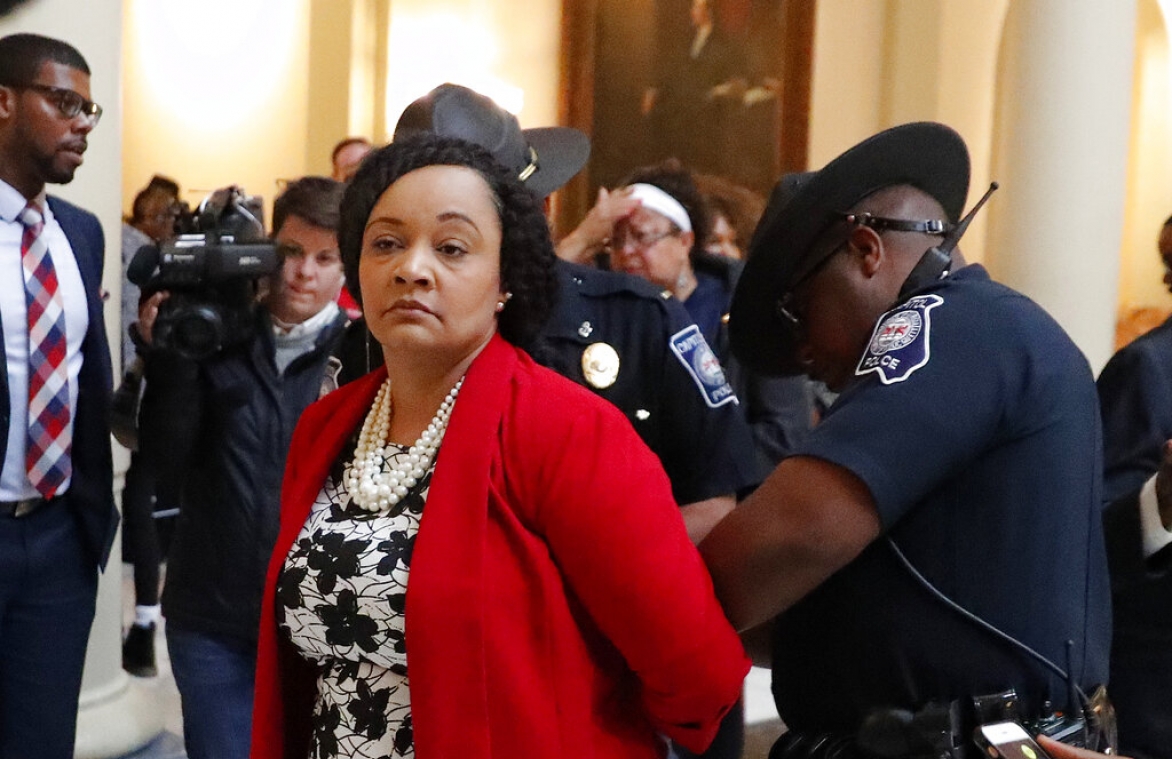By KATE BRUMBACK, Associated Press
A Georgia state lawmaker and nine others arrested while protesting at the state Capitol in the wake of the 2018 midterm elections have filed a lawsuit seeking to prohibit further enforcement of the law cited in their arrest.
Democratic State Sen. Nikema Williams was among 15 people arrested in November 2018 while calling for uncounted ballots to be tallied. The demonstration happened against the backdrop of lingering uncertainty over the outcome of the race for governor.
The federal lawsuit filed Sept. 29 against a dozen Department of Public Safety officers targets a state law that makes it illegal for any person “recklessly or knowingly to commit any act which may reasonably be expected to prevent or disrupt a session or meeting of the Senate or House of Representatives.” The suit says the law is “nearly identical” to one that was previously declared unconstitutional by the Georgia Supreme Court.
The law is unconstitutional and overly broad, the lawsuit says, alleging that it violates the First Amendment free speech protections because it does not require proof of intent to disrupt or proof of any actual disruption.
The demonstrators fear being arrested again if they participate in protests against voter suppression and disenfranchisement in the November general election, according to a news release from the Southern Center for Human Rights, which filed the lawsuit along with other attorneys, including Democratic state Rep. David Dreyer.
In addition to seeking to stop enforcement of the law used to arrest them, the protesters are asking for damages “for being deprived of their liberty and silenced because of their political speech,” the lawsuit says.
“Surely, at the core of free speech is the right of citizens to speak their minds about voter suppression in the seat of their own state government,” Southern Center for Human Rights lawyer Gerry Weber said in the release. “Our clients simply want the protection of a court order so that they can voice their concerns about voting rights without fearing unconstitutional arrests.”
Department of Public Safety spokeswoman Lt. Stephanie Stallings said in an email that the agency has not been served with the lawsuit and does not comment on pending litigation.
Williams, who is also the chairwoman of the state Democratic Party, was selected by the party to run for the U.S. House seat that had been occupied by Rep. John Lewis, who died in July.
Georgia Department of Public Safety officers arrested Williams and the others on Nov. 13, 2018, as they packed the Capitol rotunda and some began chanting, “Count every vote!” The agency said at the time that the demonstrators were disrupting orderly conduct of official business.
“I’m being arrested because I refused to leave the floor of this building where I’m a state senator,” Williams said as she was escorted from the building. “I wasn’t yelling. I wasn’t chanting. I was standing peacefully beside constituents I represent.”
Unofficial results at the time of the demonstration gave Republican Brian Kemp a slim lead in the race for governor, but Democrat Stacey Abrams maintained that enough uncounted absentee, mail-in and provisional ballots remained to force a runoff. Kemp ultimately became governor.
A federal judge had ordered state officials the day before not to do their final certification of election results for several more days to ensure that ballots were counted.
The charges against Williams and the others were dismissed in June 2019.

